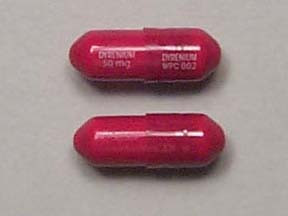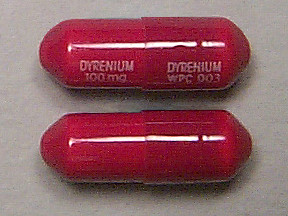TRIAMTERENE - ORAL
PHONETIC PRONUNCIATION: (trye-AM-ter-een)
COMMON BRAND NAME(S): Dyrenium
GENERIC NAME(S): triamterene
Uses
USES: Triamterene is a "water pill" (diuretic) that works in your kidneys to increase the amount of urine you make. This helps your body get rid of extra water. This medication is used to decrease swelling (edema) caused by conditions such as cancer, congestive heart failure, liver disease, and kidney disease. This effect can help your kidneys work better and lessen symptoms such as trouble breathing and swelling in your ankles, feet, hands, or belly.
How to use TRIAMTERENE - ORAL
HOW TO USE: Take this medication by mouth as directed by your doctor, usually once or twice a day after a meal. If you take this drug too close to bedtime, you may need to wake up to urinate. It is best to take this medication at least 4 hours before your bedtime. To reduce your risk of side effects, your doctor may direct you to start this medication at a low dose and gradually increase your dose. Follow your doctor's instructions carefully. The dosage is based on your medical condition and response to treatment. Use this medication regularly to get the most benefit from it. To help you remember, take it at the same time(s) each day. Do not increase your dose or use this drug more often or for longer than prescribed. Your condition will not improve any faster, and your risk of side effects will increase. Do not stop taking this medication without consulting your doctor. Some conditions may become worse when this drug is suddenly stopped. Your dose may need to be gradually decreased. Tell your doctor if you do not get better or if you get worse.
Side Effects
Precautions
Interactions
Overdose
Images

- color
- red
- shape
- oblong
- imprint
- DYRENIUM 50 mg, DYRENIUM WPC 002

- color
- red
- shape
- oblong
- imprint
- DYRENIUM 100mg, DYRENIUM WPC 003
Reviews
Faq for TRIAMTERENE - ORAL
Triamterene is an oral medication that belongs to a class of drugs known as potassium-sparing diuretics. It works by blocking the reabsorption of sodium in the kidneys, which leads to increased excretion of sodium and water from the body. Triamterene helps reduce fluid buildup and lowers blood pressure.
Triamterene is primarily used to treat edema (fluid retention) associated with conditions such as congestive heart failure, liver cirrhosis, and kidney disorders. It is also prescribed in combination with other medications for the treatment of hypertension (high blood pressure).
Common side effects of Triamterene include dizziness, headache, nausea, excessive urination, stomach pain, and leg cramps. These side effects are usually mild and go away on their own. If they persist or worsen, it is recommended to consult a healthcare professional.
Triamterene is a potassium-sparing diuretic, which means it helps retain potassium in the body. In rare cases, it can cause hyperkalemia (high potassium levels). Therefore, it is important to regularly monitor potassium levels while taking Triamterene, especially if used in combination with other medications that can increase potassium levels.
Triamterene should be used with caution in patients with kidney or liver disease, electrolyte imbalance, diabetes, or gout. It may interact with certain medications, so it is essential to inform your healthcare provider about all the drugs you are taking. Triamterene should not be used during pregnancy or while breastfeeding without consulting a doctor.
Triamterene is usually taken orally with or without food. It is important to follow the dosage instructions provided by your doctor. Do not take more or less than the prescribed dose and do not stop taking Triamterene without consulting your healthcare provider. It may take a few weeks for the full benefits of this medication to be seen.
If you miss a dose of Triamterene, take it as soon as you remember. However, if it is close to the time for your next scheduled dose, skip the missed dose and continue with your regular dosing schedule. Do not take a double dose to make up for the missed one.
Yes, Triamterene can interact with certain medications, including ACE inhibitors, angiotensin receptor blockers (ARBs), nonsteroidal anti-inflammatory drugs (NSAIDs), potassium supplements, and certain antibiotics. Inform your healthcare provider about all the medications (prescription and over-the-counter), supplements, and herbal products you are taking before starting Triamterene.
The onset of action for Triamterene may vary depending on the individual and the condition being treated. However, it typically takes a few days to a week to notice a significant improvement in symptoms such as edema or high blood pressure.
Warning
WARNING: This medication can increase your potassium levels, especially if you have kidney disease or diabetes, or are severely ill. Potassium levels must be done while you are taking this medication. If not treated, very high potassium levels can sometimes be fatal. If you notice any of the following serious side effects, tell your doctor right away: muscle weakness, slow/irregular heartbeat.
Disclaimer
IMPORTANT: HOW TO USE THIS INFORMATION: This is a summary and does NOT have all possible information about this product. This information does not assure that this product is safe, effective, or appropriate for you. This information is not individual medical advice and does not substitute for the advice of your health care professional. Always ask your health care professional for complete information about this product and your specific health needs.
No Reviews Yet